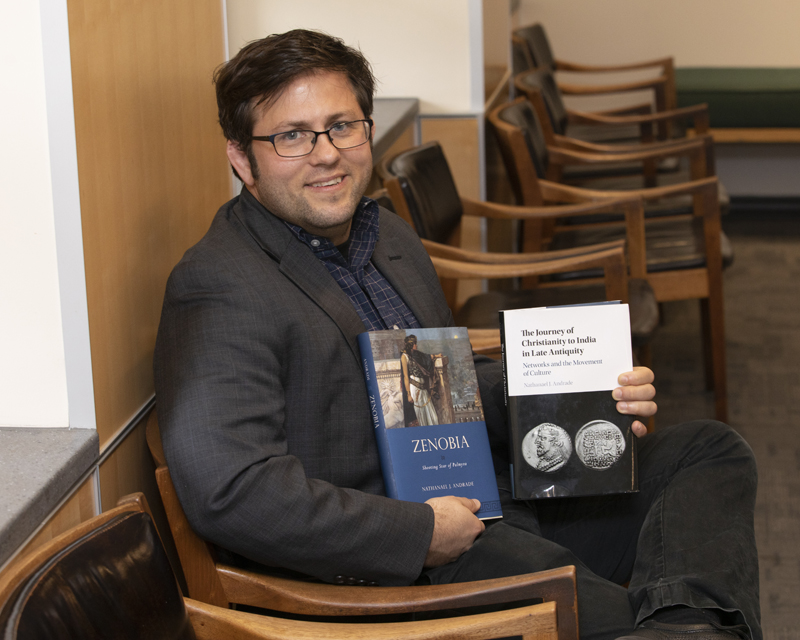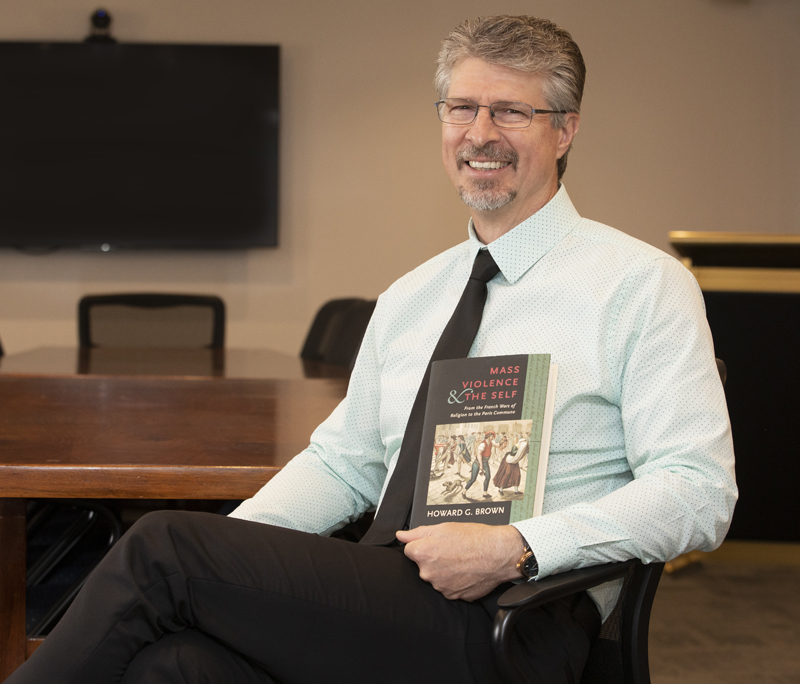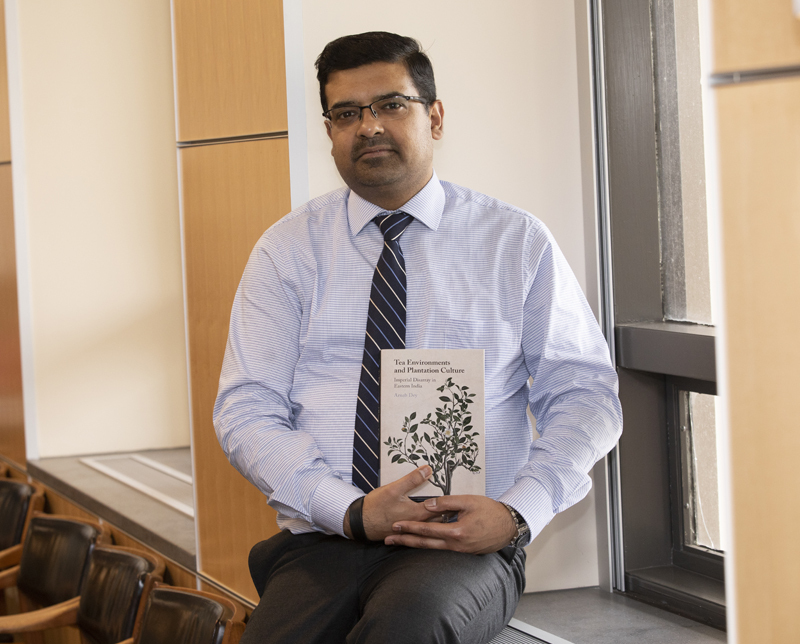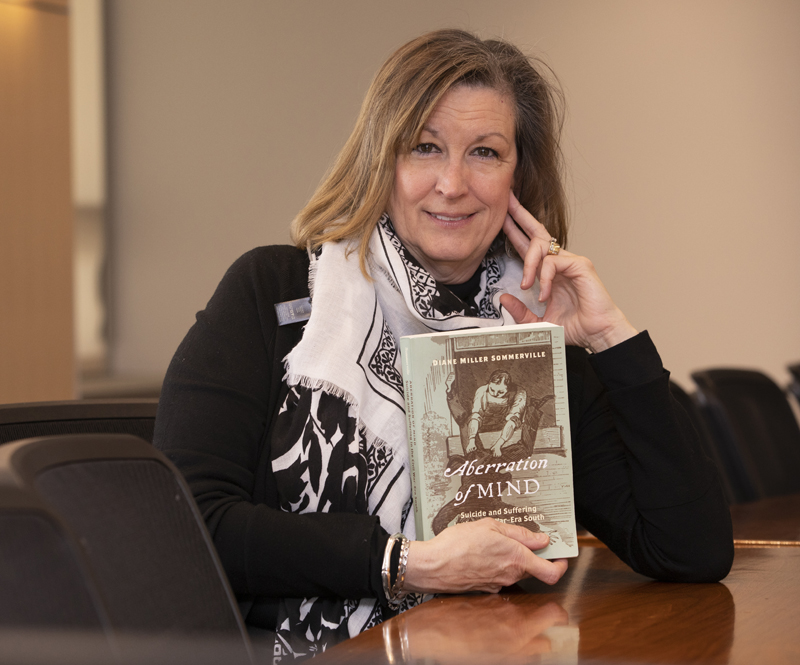History professors bring the past to the page
Harpur College faculty members discuss their new books
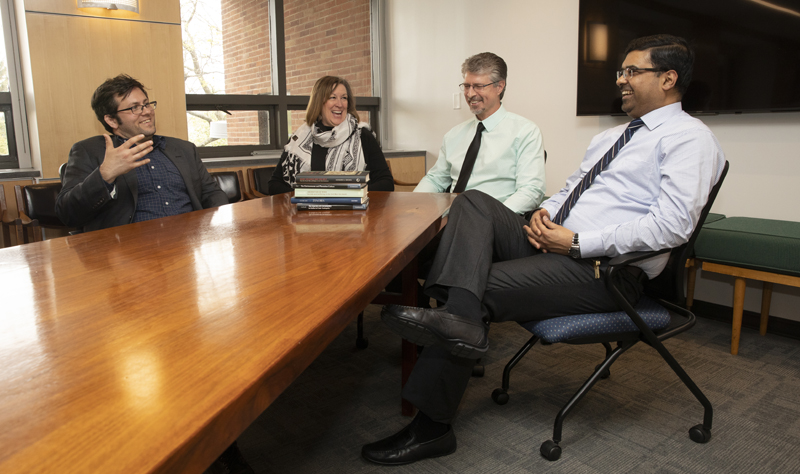
In the History Department, 2018–19 was a banner academic year for books from faculty members on topics that ranged from third-century Syria to the aftermath of the U.S. Civil War.
Professor Diane Miller Sommerville received national acclaim for Aberration of Mind: Suicide and Suffering in the Civil War-Era South, which she spent more than a dozen years researching and writing. Aberration of Mind was nominated for the Lincoln Prize, which is awarded annually for the best scholarly work related to the Civil War.
Professor Howard G. Brown, who won the American Historical Association’s 2006 Leo Gershoy Award for best book on 17th- and 18th-century European history, returned with Mass Violence & the Self: From the French Wars of Religion to the Paris Commune.
Arnab Dey, an associate professor, contributed Tea Environments and Plantation Culture: Imperial Disarray in Eastern India, while Associate Professor Nathanael Andrade penned two books — The Journey of Christianity to India in Late Antiquity: Networks and the Movement of Culture and Zenobia: Shooting Star of Palmyra.
Other authors among the history faculty included Distinguished Service Professor John Chaffee, who wrote The Muslim Merchants of Premodern China: The History of a Maritime Asian Trade Diaspora, 750–1400, and Professor Richard Mackenney, who wrote Venice as the Polity of Mercy.
Andrade, Brown, Dey and Sommerville sat down with Harpur Perspective to discuss their backgrounds, the writing process and the continued importance of studying history.
What got you hooked on history?
Sommerville: I received the eighth-grade social studies award in junior high. That was the beginning of when I knew I was passionate about history. Living in southwestern Pennsylvania — the French and Indian War took place where I grew up, and we had an Indian settlement on the farm where we would find relics — was the cauldron of my history interests.
Brown: Mine goes back to a similar age — maybe a little later. Canada had all 16-year-olds at that time take a set of aptitude tests. The results for me were that I was best suited to become A) a design engineer or B) a historian. I can’t even remember C, D and E anymore! Even though math and physics were my best disciplines in high school, I went for history instead of design engineer.
Dey: For me, it’s both personal and professional. It’s personal because my book is about a region I grew up around. But it’s also professional because I was fortunate enough to have had a strong, humanist education. History was an extension of that, even though my first degrees were all in literature.
Andrade: What pulled me to become an ancient historian was that I had many relatives who were devout Catholics. One in particular became a Carmelite and, as a result, I was interested in early monasticism and the Roman Empire. From there, graduate school moved me into different places. . . . But I think that’s what led me to Roman history.
If you weren’t writing and teaching in your fields of expertise, what area of history would you like to explore?
Dey: That’s a tough question!
Sommerville: I started out doing 20th-century southern history. I was interested in racial segregation. It was the jump from my [master’s] institution in Charlotte, N.C., to Rutgers [for a PhD], where I was paired with a 19th-century women’s historian. I guess it rubbed off. But I always thought I would be a 20th-century U.S. historian.
Andrade: I always found that more recent periods of history have a profound depth that is hard for ancient historians to aspire to. I wish I was capable of writing any of these books from my colleagues! [laughs]
Brown: I was close to going into late 19th-century/early 20th-century German history — origins of the First World War. I had taken some German in high school.
Dey: Historical fiction is something I may have gotten into because of my earlier interest in literature. I’m still invested in it and continue to include relevant [titles] in my classes.
Brown: Did you do any creative writing?
Dey: No, not anymore. … I can’t read a novel as a reader anymore. You get a pencil and start making notes. It can destroy the art of reading because you have this idea that you need to find meanings, connections and arguments.
Brown: Go to audiobooks! You can’t pencil those.
Andrade: I can’t recall the last time I read something for enjoyment.
Sommerville: It’s one of the great regrets: There’s not enough time for leisure. I try to read a novel at the end of every semester to give my mind a break, but I don’t read enough fiction.
Brown: I push myself to read at least one [novel] a month; actually an audiobook and a print book.
Andrade: I read a lot of fiction — second century! [group laughs] What is the most challenging aspect of writing a book? Research? Finding the time to write?
Dey: For me, there is no one moment that is challenging to the craft of writing. It happens over a long period; it happens in spurts; it happens in bits and pieces. For me, the principle behind writing the book was clear: I was only looking for evidence that added new material to the story — which, in my case, was already well-researched and documented over a long period of time.
Brown: Research is easy compared to the actual writing. Research is fun and like a detective story. Turning it into an explanation of what you found and what you think it means can make for some serious challenges when you’re looking at a blank screen. I get over some of those challenges by having a ritual in which I wear writing clothes. I don’t let myself do anything else in that garb but face the screen and write.
Sommerville: I rely on a lot of Milk Duds.
Andrade: Ooh, those are good!
Sommerville: They give me the energy to write! I share Howard’s assessment: Research is fun. The favorite thing I do professionally is go into the archives and then try to piece together disparate fragments of sources. It’s challenging. I need sustained periods of time to write. There’s a rule that you should write 500 words a day. I can’t do that. I have to sit down and write over eight hours, 10 hours a week, two weeks, three weeks. I find it difficult with teaching and advising — and the dogs at home — to sit down and be uninterrupted.
Brown: When you only have part of a book written and you’ve got three or four chapters to finish, those will take years if you don’t have six months or 12 months to get the chapters done.
Dey: I don’t think I’ve written anything scholarly during an active semester.
Andrade: I’m different: I write daily. I enjoy that as part of the creative enterprise. It’s finishing the books that I despise. Putting an index together makes me not want to write books!
Sommerville: I have the name of a good indexer.
Andrade: Good, I can use one!
What is the most rewarding part of the writing process? Seeing the finished work? The “a-ha” research moment?
Brown: I’d rather see my books in footnotes than on shelves. That’s why I’m writing mostly for peers rather than for a larger, popular audience. If I’ve had an influence and my books keep appearing in people’s footnotes, then I’m gratified.
Dey: There’s an immediate component and a long-term [reward]. The long-term one is hoping that you have contributed something new to your field. The more immediate experience of gratification for me is to have a completed chapter! To step back and see 35,000 words come together in a cogent narrative is immensely gratifying for me.
Sommerville: I spent the better part of 14 years on my book, so there’s an element of just wanting to get it behind you and move on to the next project. [group laughs] Now people are reading the book and you go to the gatherings and they want to talk about your book. Once I start that, I get a little excited and the adrenalin is flowing. But to be honest with you: I’m ready to go to the next project. I haven’t been into the archives in a long time.
Andrade: I’m most gratified by the actual process: doing the research and writing. I find it self-sustaining; I enjoy it. It’s easy for me to start projects and get deep into them.
What are the gifts that a history major or scholar can give the world?
Dey: There are two skills. One is the more specific, which we often forget: that is the ability to distill and highlight the most relevant data and evidence from a mass of material in a limited amount of time. It’s a skill that all of the disciplines and career paths use. But the larger value I try to get across is that it’s not enough for us to be “workers” and “creators” of wealth and services. We need to be involved citizens. It’s not enough to be somebody who produces; it is important to be someone who thinks and acts independently.
Brown: [History graduates] start with a combination of skills that are in extremely high demand because they are extremely rare now. That combination is intensive analytical thinking, careful and accurate writing, and the powerful drawing of conclusions from the two. A lot of people have opinions, a lot of people don’t have the facts and a lot of people aren’t particularly rigorous about their thinking. To pull those three together is critical to a lot of leadership roles in industry and communication sectors. It’s much more widespread than journalism or law might suggest. Those are two traditional careers for historians.
Andrade: I like to think of history majors as lifelong historians, even if they don’t do it in the way that we do. One of the things we do is guide students to see through the narratives that are circulating all over our globalized world — and then [they] teach others how to do it. Even in ancient history, this is a real issue. One of the biggest myths is that the Mediterranean is a fundamentally white place. This is a narrative that has been repeated a lot recently. So it’s important for students to exercise that analytical rigor and to deal with sources in a serious way. And not to believe everything they’re told!
Brown: Approach everything with a certain skepticism.
Sommerville: When I say goodbye to my students, I tell them there are three things they should have learned from the material in the course that will inform their own lives. One of them is vigilance: the importance of understanding, reading, being informed and knowing the difference between facts and [what are] not facts. Second is advocacy: knowing that when there is something wrong in the system or an injustice, that they need to advocate for reform and correction. And third is activism. The Washington Post has the masthead “Democracy dies in darkness.” Democracy also dies in complacency. I preach to [students] that my generation is relying on them to carry the mantle and respond to their own perceptions about wrongs and injustices.

